Amity University-Noida B.Tech Admissions 2026
Among top 100 Universities Globally in the Times Higher Education (THE) Interdisciplinary Science Rankings 2026
JEE Main Syllabus with Weightage 2026 -As the JEE Main 2026 exam approaches, understanding the chapter-wise weightage for Physics, Chemistry, and Mathematics becomes crucial. This guide will help students focus on high-yield topics to maximize their score and boost exam preparation. The syllabus of JEE Mains 2026 with weightage consists of important and high-weightage chapters and topics for candidates to focus on while preparing for the JEE Main exam. Candidates can refer to the JEE Main syllabus with weightage PDF to know the chapter-wise weightage for the JEE Mains 2026 exam. Focusing on the JEE Main syllabus with weightage 2026 will help candidates secure good marks in the exam. The JEE Main 2026 exam will be held from April 2 to 9, 2026.
The NTA has announced the JEE Mains 2026 Paper 2 Session 1 scorecard on the official website. Candidates can download and check their Paper 2 scorecard at jeemain.nta.nic.in. In case of any discrepancies, candidates can contact the NTA Helpdesk at 011-40759000 or email jeemain@nta.ac.in immediately.
This Story also Contains
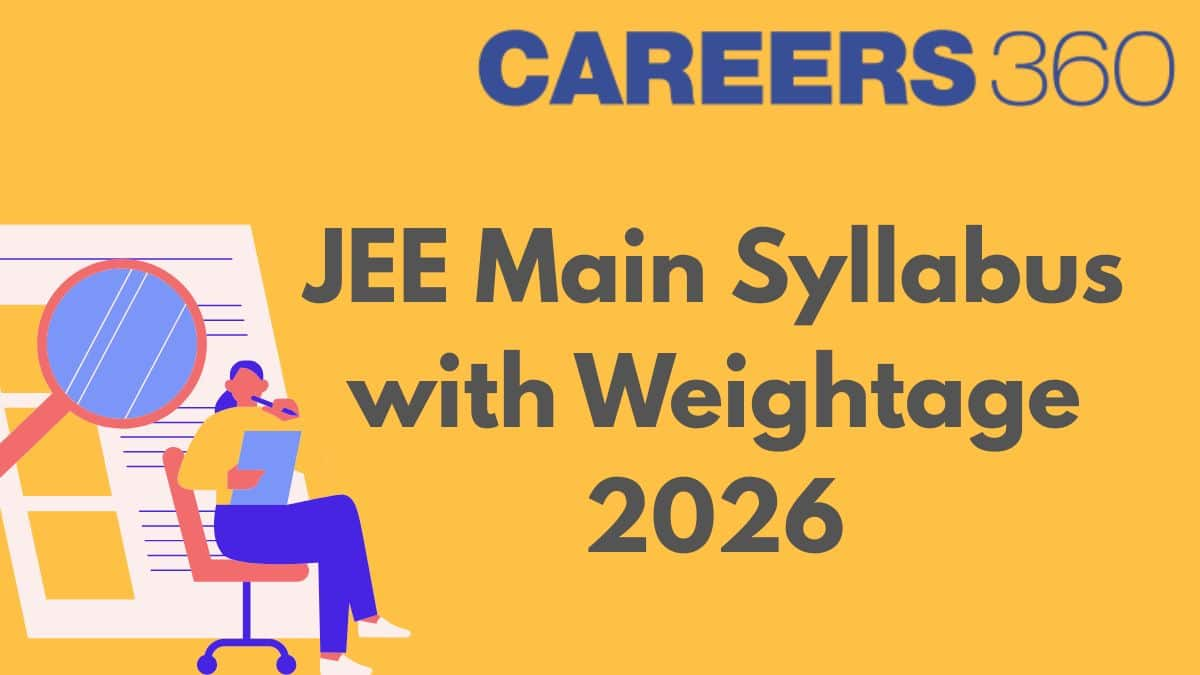
However, candidates must avoid skipping any of the topics included in the syllabus. The National Testing Agency has released the JEE Main syllabus 2026 on the official website, jeemain.nta.nic.in. The JEE Mains chapter-wise weightage PDF is one of the most searched queries by candidates while preparing for the upcoming JEE Mains exam. The JEE Main 2026 important topics comprise topics from NCERT Class 11 & Class 12 Physics, Chemistry, and Mathematics subjects.
Related link: Download JEE Main previous year question papers pdf | Crack JEE Main 2026
Here, we have provided the list of the high-weightage chapters for JEE Mains 2026. Candidates can download the JEE Mains weightage chapter-wise 2026 PDF to get brief information about the weightage of chapters in JEE Mains. The JEE Mains Weightage Chapter Wise 2026 pdf for Physics, Mathematics, and Chemistry has been prepared based on the exam analysis and expert opinions. Candidates can refer to the previous year's JEE syllabus with weightage released by Resonance. Candidates can learn the high-weightage chapters for the JEE Mains subject-wise below.
Among top 100 Universities Globally in the Times Higher Education (THE) Interdisciplinary Science Rankings 2026
Last Date to Apply: 28th Feb | Ranked #43 among Engineering colleges in India by NIRF | Highest Package 1.3 CR , 100% Placements
Aspirants can check the JEE Main chapter-wise weightage for the Physics paper 2026 from the table below. Understanding the physics weightage in JEE Mains can aid candidates in strategising their preparation effectively. According to the JEE Main 2026 syllabus, some topics have been deleted. These topics are also specified in the table below.
The most weightage chapters for JEE Mains Physics 2026 are Modern Physics, Heat and Thermodynamics, Optics, Current Electricity, and much more. Check the previous year's modern physics weightage in JEE Mains below.
| Topics | No of Questions | Marks |
|---|---|---|
Modern Physics | 5 | 20 |
Heat and Thermodynamics | 3 | 12 |
Optics | 3 | 12 |
Current Electricity | 3 | 12 |
Electrostatics | 3 | 12 |
Magnetics | 2 | 8 |
Unit, Dimension and Vector | 1 | 4 |
Kinematics | 1 | 4 |
Laws of motion | 1 | 4 |
Work, Power and Energy | 1 | 4 |
Centre Of Mass, Impulse, and Momentum | 1 | 4 |
Rotation | 1 | 4 |
Gravitation | 1 | 4 |
Simple Harmonic Motion | 1 | 4 |
Solids and Fluids | 1 | 4 |
Waves | 1 | 4 |
Electromagnetics Induction; AC | 1 | 4 |
Also check: Detailed JEE Main Syllabus for Physics
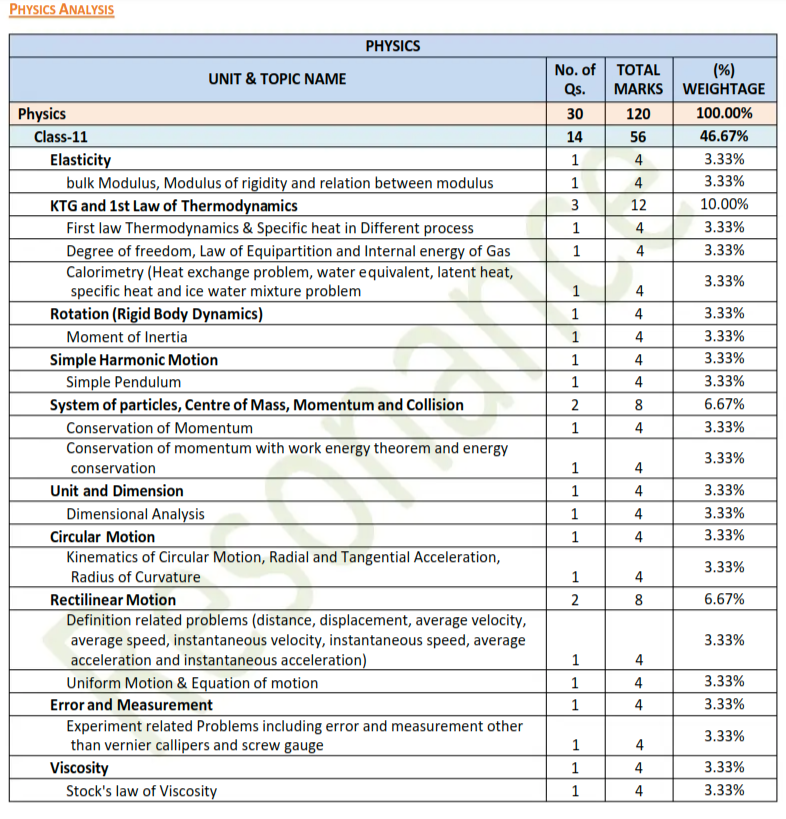
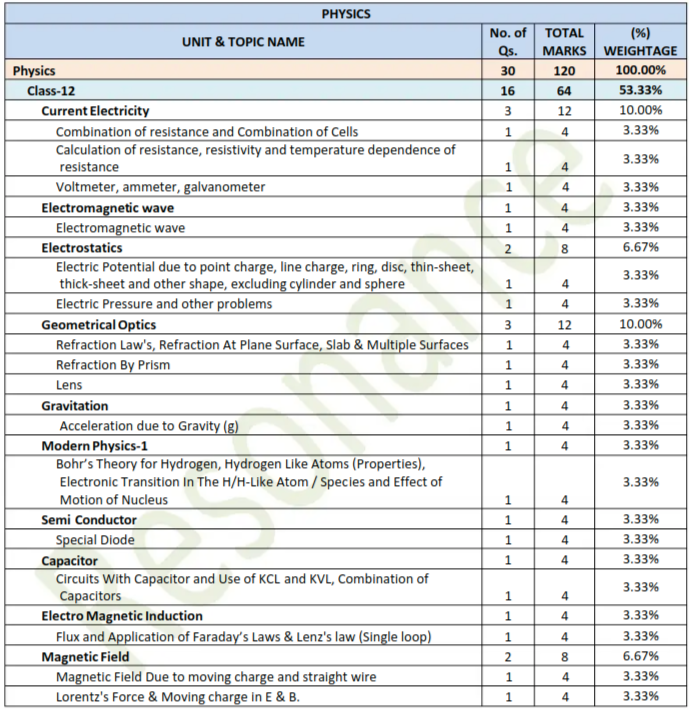
| Chapter Name | Concept Name |
|---|---|
| Physics and Measurement | Physical quantity |
| System of unit | |
| Practical units | |
| Dimension | |
| Frequency, angular frequency, angular velocity, velocity gradient | |
| Work, Energy and Power | Nature of Work Done |
| Work done by variable force | |
| Kinetic energy | |
| Potential energy | |
| Potential energy curve | |
| Rotational Motion | Center of mass |
| Position of centre of mass for solid cone | |
| Motion of the centre of mass | |
| Equations of Linear Motion and Rotational Motion. | |
| Torque | |
| Properties of Solids and Liquids | Stokes' law & Terminal Velocity |
| Surface energy | |
| Excess pressure inside a liquid drop & soap bubble | |
| Thermal stress and thermal strain | |
| Heat | |
| Kinetic Theory of Gases | Gas laws(I) |
| Ideal gas equation | |
| Various types of speeds of ideal gases | |
| Kinetic energy of an ideal gas | |
| Electromagnetic Induction and Alternating Currents | Magnetic flux |
| Faraday's law of induction | |
| Motional Electromotive force(I) | |
| AC voltage applied to an inductor | |
| Motional Electromotive force(II) | |
| Experimental Skills | Simple pendulum-dissipation of energy by plotting a graph between the square of the amplitude and time |
| To measure the thickness of the given sheet using a screw gauge | |
| To measure the diameter of a small spherical cylindrical body using Vernier Callipers | |
| To determine the resistance of a galvanometer by the half-deflection method and to find its figure of merit |
Recognized as Institute of Eminence by Govt. of India | NAAC ‘A++’ Grade | Upto 75% Scholarships
98% Placement Record | Highest CTC 81.25 LPA | NAAC A++ Accredited | Ranked #62 in India by NIRF Ranking 2025 | JEE & JET Scores Accepted
Candidates can check the JEE Main chapter-wise weightage for Chemistry 2026 to know which topic contains high marks. Below is the organic, physics, and inorganic chemistry weightage in JEE Main. Moreover, candidates will get to know the inorganic chemistry weightage in JEE Mains.
Candidates can check the previous year's Chemistry weightage in JEE Main to know which topics are most important and require more practice. Check the table for chemistry JEE Mains weightage 2026:
| Topics | No of Questions | Marks |
|---|---|---|
Transition Elements and Coordination Chemistry | 3 | 12 |
Periodic table and Representative Elements | 3 | 12 |
Thermodynamics And Gaseous State | 2 | 8 |
Atomic Structure | 2 | 8 |
Chemical Bonding | 2 | 8 |
Chemical And Ionic Equilibrium | 2 | 8 |
Nuclear Chemistry And Environment | 2 | 8 |
Mole Concept | 1 | 4 |
Redox Reaction | 1 | 4 |
Electrochemistry | 1 | 4 |
Chemical Kinetics | 1 | 4 |
Solution and Colligative Properties | 1 | 4 |
General Organic Chemistry | 1 | 4 |
Stereochemistry | 1 | 4 |
Hydrocarbon | 1 | 4 |
Alkyl Halides | 1 | 4 |
Carboxylic Acid and their Derivatives | 1 | 4 |
Carbohydrates, amino acid | 1 | 4 |
Aromatic Compounds | 1 | 4 |
Read More: Detailed JEE Main Syllabus for Chemistry
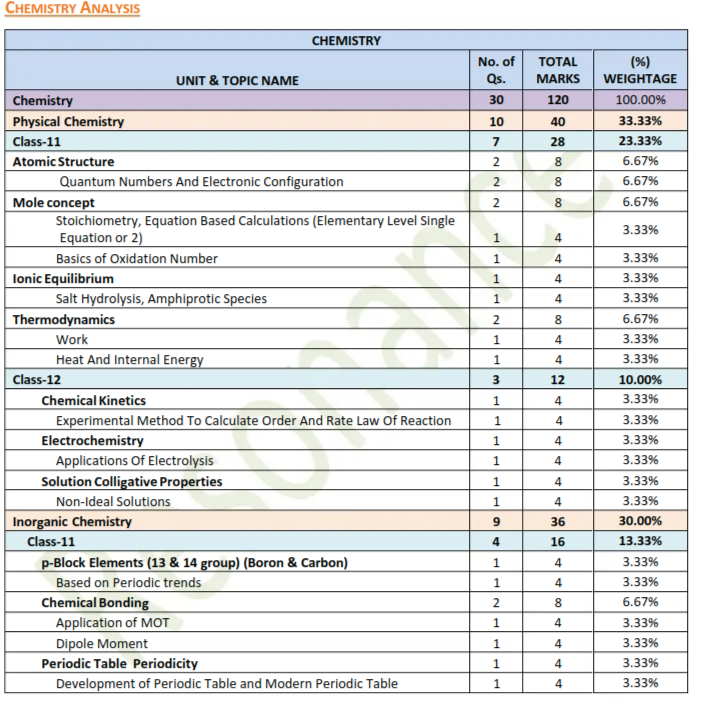
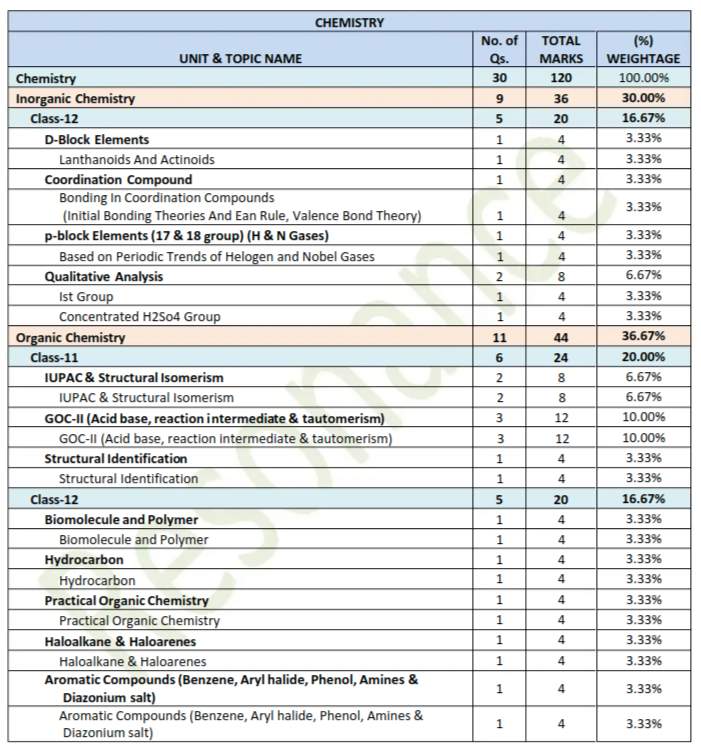
| Chapter Name | Concept Name |
|---|---|
| Some Basic Concepts in Chemistry | Empirical Formula And Molecular Formula |
| MOLE CONCEPT AND MOLAR MASS | |
| Stoichiometry, Stoichiometric Calculations And Limiting Reagent | |
| Reactions in Solutions | |
| Atomic Structure | Photoelectric effect |
| Line spectrum of hydrogen | |
| Radius, velocity and the energy of nth Bohr orbital | |
| Debroglie wavelength | |
| Heisenberg’s uncertainty principle | |
| Chemical Thermodynamics | Path, State Function, Types Of Process |
| Reversible, Irreversible, Polytropic Process | |
| First Law Or Law Of Conservation Of Energy | |
| Isothermal Reversible And Isothermal Irreversible | |
| Adiabatic Reversible And Irreversible Expansion | |
| Redox Reactions and Electrochemistry | Balancing of Redox Reactions |
| Oxidation Number and Oxidation State | |
| Types of Redox Reactions | |
| Balancing of Redox Reaction: Ion Electrode Method | |
| Balancing of Disproportionation Redox Reaction: Ion Electrode Method | |
| d - and f - Block Elements | Screening Effect and Lanthanoid Contraction |
| Atomic Size/Radii | |
| Ionisation Energy | |
| Oxidation State | |
| Magnetic Properties and Character | |
| Co-ordination Compounds | Addition Compounds or Molecular Compounds |
| Terminologies Related to Coordination Compounds | |
| Types of Ligands - 1 | |
| Oxidation Number | |
| Coordination Number | |
| Purification and Characterization of Organic Compounds | Sublimation and Crystallisation |
| Distillation under reduced pressure and Steam distillation | |
| Chromatography | |
| Test for Halogens | |
| Duma's Method | |
| Some Basic Principles of Organic Chemistry | Functional Group |
| IUPAC Nomenclature - 1 | |
| Carbocations | |
| Carbanions | |
| Alkyl Free Radicals | |
| Organic Compounds Containing Halogens | Nature of C-X bond and Physical Properties |
| Reaction with PCl5, PCl3, SOCl2 and HX | |
| Strong and Weak bases | |
| SN2 Reaction | |
| SN1 Reaction | |
| Organic Compounds containing Oxygen | Grignard Reagent - 1 |
| Reduction by LiAlH4 and NaBH4 | |
| Acylation and Oxidation of Alcohols | |
| Reaction of Phenols with dil. HNO3 | |
| Preparation of Aldehydes | |
| Principles Related to Practical Chemistry | Preliminary Test with Dilute Sulphuric Acid (Systematic Analysis of Anions): |
| Analysis of Cations | |
| Chemical Bonding and Molecular Structure | Lewis Representation of Simple Molecules (Lewis Structure) |
| Limitations of The Octet Rule | |
| Bond Parameters: length, angle, energy, strength | |
| Fazan’s Rule and Covalent Character in Ionic Bond | |
| p?-p? and p?-d? bonding | |
| Classification of Elements and Periodicity in Properties | Long form of the Modern periodic table |
| Classification of Elements: s-block | |
| Atomic Radius of Elements | |
| Variation of Atomic Radii and ionic radii | |
| Ionisation Enthalpy or Ionisation Potential |
The most weightage chapters for JEE Main Maths are coordinate geometry, limits, continuity & differentiability, integral calculus, and much more. Candidates can check the previous year JEE Main syllabus with the weightage PDF below.
| Topcs | No of Questions | Marks |
|---|---|---|
Coordinate Geometry | 5 | 20 |
Limits, Continuity and Differentiability | 3 | 12 |
Integral Calculus | 3 | 12 |
Complex numbers and Quadratic Equation | 2 | 8 |
Matrices and Determinants | 2 | 8 |
Statistics and Probability | 2 | 8 |
Three Dimensional Geometry | 2 | 8 |
Vector Algebra | 2 | 8 |
Sets, Relation and Function | 1 | 4 |
Permutations and Combinations | 1 | 4 |
Binomial Theorem and Its Application | 1 | 4 |
Sequences and Series | 1 | 4 |
Trigonometry | 1 | 4 |
Differential Equation | 1 | 4 |
Statics and Dynamics | 1 | 4 |
Differential Calculus | 1 | 4 |
Read More: Detailed JEE Main Syllabus for Mathematics
Here we have provided the Maths weightage in JEE Main. Candidates can check the previous year in JEE Mains Maths chapter-wise weightage.
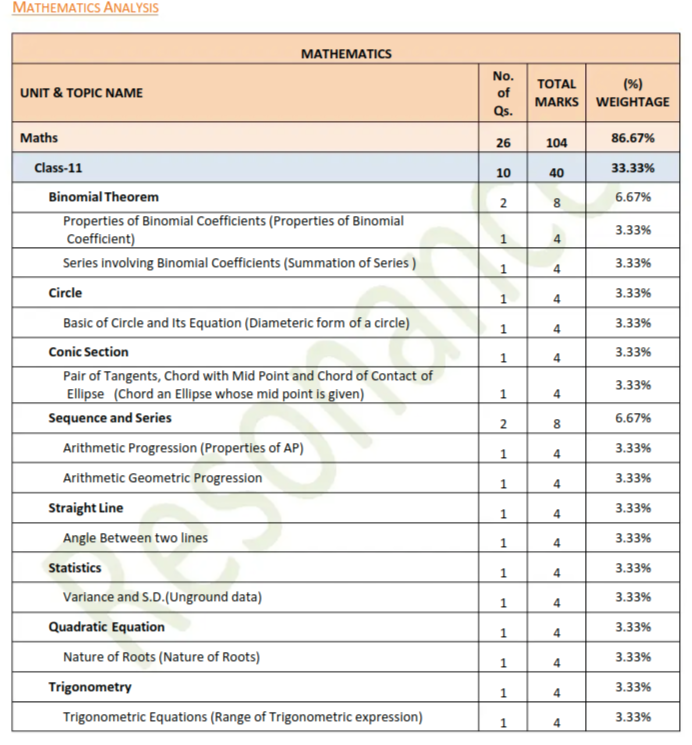
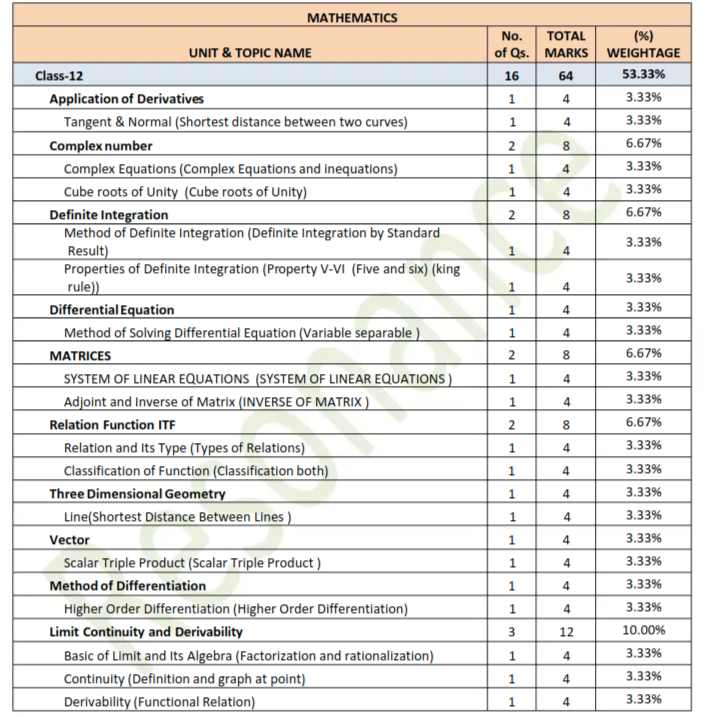
To cover the chapters, candidates should refer to the NCERT 12th solutions and the NCERT 11th solutions. Candidates can get here the previous year's chapter-wise JEE Mains syllabus with weightage to know which topics and units were asked. Candidates should analyze the JEE Mains syllabus 2026 with weightage to cover all high-weightage topics to score well in the exam. It is suggested to solve JEE Mains previous years' papers to know the type of questions asked and high-weightage chapters and topics.
| Chapter Name | Concept Name |
|---|---|
| Sets, Relations, and Functions | Subsets, Proper Subset, Improper Subset, Intervals |
| Union of sets, Properties of union | |
| Intersection of Set, Properties of Intersection | |
| Cardinal number of some sets | |
| Domain, Range of Relation | |
| Complex Numbers and Quadratic Equations | Iota and powers of Iota |
| Complex number | |
| Conjugate of complex numbers and their properties | |
| Modulus of complex number and its Properties | |
| Euler form of complex number | |
| Matrices and Determinants | Matrices, order of matrices, row and column matrix |
| Multiplication of two matrices | |
| Properties of matrix multiplication | |
| Transpose of a matrix | |
| Transpose conjugate of a matrix and properties | |
| Permutations And Combinations | PERMUTATION AS AN ARRANGEMENT |
| APPLICATION OF PERMUTATION-I | |
| GEOMETRICAL PERMUTATIONS | |
| DIFFERENT CASES OF GEOMETRICAL ARRANGEMENTS | |
| RANK OF A WORD IN A DICTIONARY | |
| Binomial Theorem and its Simple Applications | Binomial Theorem and Expression of Binomial Theorem |
| Properties of Binomial Theorem and Binomial Coefficient (Part 1) | |
| Properties of Binomial Theorem and Binomial Coefficient (Part 2) | |
| Some Standard Expansions (Part 2) | |
| General Term of Binomial Expansion | |
| Sequences and Series | Sequences, Series and Progression |
| Arithmetic Progression | |
| Important Properties of an AP -Part 1 | |
| Important Properties of an AP -Part 2 | |
| Sum of n terms of an AP | |
| Limit, Continuity and Differentiability | Algebra of Limits |
| Limit of Indeterminate Form and Algebraic limit | |
| Limit of Algebraic function | |
| Algebraic Function of type ‘infinity (∞) | |
| Trigonometric Limits | |
| Integral Calculus | Integration as Reverse Process of Differentiation |
| Fundamental Formulae of Indefinite Integration (Trigonometric Functions) | |
| Some Special Integration | |
| Application of Special Integral Formula (Part 1) | |
| Integration by Parts | |
| Differential Equations | Differential Equation |
| Formation of Differential Equation and Solutions of a Differential Equation | |
| Homogeneous Differential Equation | |
| Linear Differential Equation | |
| Bernoulli’s Equation | |
| Co-ordinate Geometry | Coordinate Axes |
| Distance between two points | |
| Section Formula | |
| Centroid | |
| Incentre | |
| Three Dimensional Geometry | Introduction to 3D Coordinate System |
| Section Formula, Direction Cosines and Direction Ratio | |
| Equations of a Line | |
| Angle Between Two Intersecting Lines | |
| Skew Lines | |
| Shortest Distance between Two Lines | |
| Vector Algebra | Types of Vectors |
| Direction Cosines and Direction Ratio | |
| Component of vector and Vector Joining Two Points | |
| Multiplication of a Vector by a Scalar | |
| Section Formula | |
| Statistics and Probability | Mean |
| Median | |
| Mode | |
| Dispersion (Range, Mean Deviation) | |
| Dispersion (Variance and Standard Deviation) | |
| Trigonometry | Trigonometric Ratio for Compound Angles (Part 1) |
| Measurement of Angle | |
| Trigonometric Functions of Acute Angles | |
| Trigonometric Identities | |
| Trigonometric Ratio for Compound Angles (Some more Result) |
Check out the video explanation for JEE Main high-weightage topics subject-wise for more insights on the JEE Mains syllabus.
Frequently Asked Questions (FAQs)
No, questions will be asked from every topic covered by JEE Main. The formulation of questions in exam depends of authority; but there is no such parity among topics.
Students can find the topic wise distribution of questions from JEE Main syllabus with weightage to understand which topics have been covered in recent years. This will help students to study for the exam accordingly.
Yes! JEE Main will be conducted in online mode only.
NTA will conduct the JEE Main 2026 exam for session 1 between January 21 and 30 and session 2 between April 2 and 9, 2026.
Yes, the JEE Main 2026 syllabus has been released on the official website.
Chemical Bonding, Organic Chemistry (especially General Organic Chemistry), Chemical Kinetics, Thermodynamics, and Equilibrium, are the he most important chapters in Chemistry for JEE Main 2026.
On Question asked by student community
Approx 1 lakh to 3 lakhs as you are from a general category
There are many NITs that accepts JEE Main rank below 35,000 in different branches including Civil Engineering, Chemical Engineering, and many more. These NITs are -
Yes, based on previous years' trends, some of the good colleges that offer BTech admissions with JEE Main rank between 65,000–80,000 include:
Arnav Gautam & P.Mohith secured 300 out of 300 in JEE Mains session 1, as per the provisional answer key. The list of toppers to be released with JEE Main results
JEE Main 2026 session 1 result is not declared yet. JEE Main session 1 result will be declared on February 12.
Among top 100 Universities Globally in the Times Higher Education (THE) Interdisciplinary Science Rankings 2026
Recognized as Institute of Eminence by Govt. of India | NAAC ‘A++’ Grade | Upto 75% Scholarships
Highest CTC 44.14 LPA | UGC Approved | 1600+ Recruiters | 100% Placement
NAAC A++ Grade | Recognized as Category-1 Deemed to be University by UGC | 41,000 + Alumni Imprints Globally
India's youngest NAAC A++ accredited University | NIRF rank band 151-200 | 2200 Recruiters | 45.98 Lakhs Highest Package
NAAC A++ Accredited | Accorded institution of Eminence by Govt. of India | NIRF Rank #3